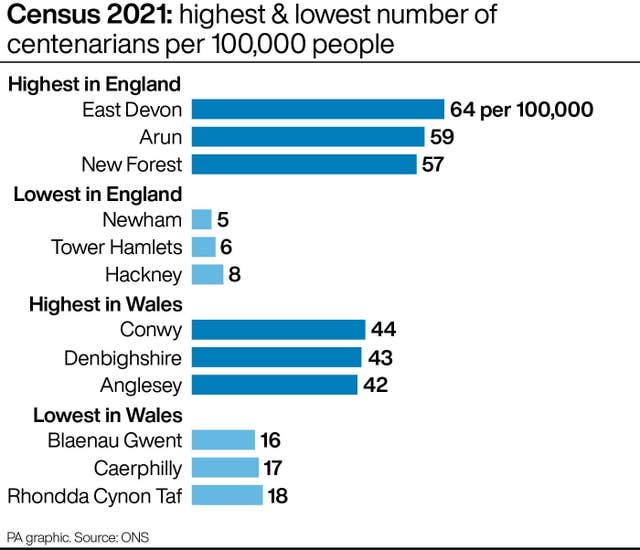Record number of centenarians in England and Wales, census shows
There were 13,924 people aged 100 or older in 2021, the Office for National Statistics said.

The number of centenarians living in England and Wales is at a record high – having risen from just 110 people to almost 14,000 in the past century.
The number of people aged 100 or older across the two nations on Census Day in 2021 was 13,924, the Office for National Statistics (ONS) said.
This figure is around a 127-fold increase on the 1921 census – and the rise has led to renewed calls for a better strategy to deal with an ever-ageing population.

The 2021 figure was up by a quarter on 2011, although centenarians still only represent 0.02% of the total population.
There were 11,288 female and 2,636 male centenarians in England and Wales when the latest census was carried out, continuing the pattern of more females than males due to a higher life expectancy for females.
The latest statistics showed that two in five centenarians lived alone, a similar proportion lived in a communal establishment – mostly care homes – and the remaining one in five lived in private households with other people.
The local authorities with the largest numbers of centenarians per 100,000 people were all on the south coast of England.
There were 64 people who had reached 100 or older per 100,000 people in East Devon, 59 per 100,000 in Arun in West Sussex, and 57 per 100,000 in the New Forest, the ONS said.
They added that of the top 10 local authorities with the highest number of centenarians per 100,000 population, nine were in coastal areas.
Birmingham had the highest number of centenarians overall at 193 – but there were only 17 centenarians per 100,000 people.
The ONS said there were eight local authorities with fewer than 10 centenarians per 100,000 people.
Of these, the ONS said six were London boroughs – Newham (5 per 100,000); Tower Hamlets (6); Hackney (8); Islington (9); Lambeth (9); and Lewisham (9.6).
The other two were Knowsley in the north-west of England and Crawley in West Sussex – both with nine centenarians per 100,000 population.
A quarter of centenarians reported having good or very good general health.
Some three in 10 centenarians reported having no disability, but of the disabled centenarians, 80.1% said they were limited a lot in their day-to-day activities.
Men who had reached the age of 100 or older were more likely to be non-disabled than women and were also more likely to report having good or very good health, the ONS added.
Dr Carole Easton, chief executive at the Centre for Ageing Better, said society is “ill-prepared for this significant demographic shift”.
She said: “We have an ageing population, but there is no overall strategy to prepare for the complex social and policy challenges that this will generate.
“Older workers continue to be undervalued and overlooked, the vast majority of our housing does not meet the needs of the people that live in them as they age, ageism is a widespread poison within our society that is not taken seriously enough.
“This is why we need a Commissioner for Older People and Ageing in England to act as an independent champion for older people and ensure that policymaking across government considers the long-term needs of our ageing population.”
There is already a commissioner for older people in Wales.
Londoner Lauretta Boston turned 100 in October 2022, and told the ONS: “I live alone, but I never get lonely. I never seem to have enough time, because everything is a big effort and I’m so slow. It takes me time to do everything, so the days seem short. I also have my music and my family and friends.”
She addressed some of the challenges of ageing, including friendships and other people’s perceptions.
She said: “I have had friends who also lived a long time. Two of them lived to 90 and one to 102, but unfortunately they have passed on. That’s what happens. Friends I have made more recently don’t know me as well as friends I knew when I was young. They can be very good friends but can only really see you as you are now.”
She added: “I always think it would be a good idea if people living in nursing homes had a picture of themselves when they were younger and at their best so they can look at themselves and remember how they really are and not what everyone sees as just someone old. I am still the same person I was back then.”





